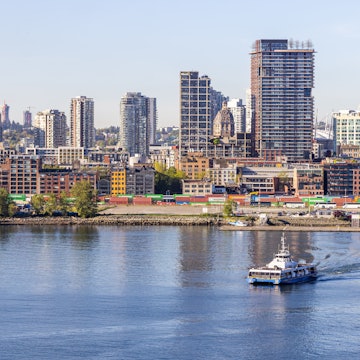

Join locals on the trail on a bikepacking trip in Oregon © Sawaya Photography / Getty Images
Oregon is a big state with a lot of scenery, from towering forests that have stood for centuries to long stretches of windswept coastline offering head-turning views at every bend. While parts of the state – particularly cities and larger towns – are pedestrian-friendly, you’ll need a good transportation strategy to see the best of the state.
Here’s what you need to know before deciding how to get around Oregon.
Go by train to focus on the scenery
If you want to sit back and enjoy the view, or are simply looking for an eco-friendly alternative to driving, you can't beat seeing Orgeon by train. Amtrak runs two lines through the state: the Coast Starlight and the Amtrak Cascades. The former connects Seattle to Los Angeles, cutting across Oregon along the way. This line calls at Portland, Salem, Albany, Eugene, Chemult (near Crater Lake) and Klamath Falls before crossing into California. The Amtrak Cascades follows a similar trajectory from Portland, but only goes as far as Eugene, making it a great option for Willamette Valley sightseeing, but less than ideal if you want to cover the whole state. When it comes to checking out the scenery, the Coast Starlight has an advantage, as it features two levels of seating and an observation car with enormous windows.

Explore by car for maximum flexibility
Oregon is huge, and not all of it is connected by public transportation, especially once you get out of the larger cities. The best way to maximize your time here is by renting a car (or a van or RV) and exploring independently. If you come between October and May, be prepared for the possibility of snow when crossing higher-elevation areas, especially if you’re traveling east of Interstate 5 (I-5), the West Coast’s main north-to-south artery. Forest fires in the summer occasionally also cause road closures. For up-to-date information, consult the Oregon Department of Transportation's TripCheck tool.
These road trips will take you to all the highlights in Oregon.
Travel like a local and go by bike
Oregonians love their bicycles, and if you’re an experienced cyclist who doesn’t mind traveling light, you can see a lot of the state on two wheels. Quite a few Oregon hotels offer bike storage (some will even let you take your bike into your room), and hiker/biker camping is offered in many of Oregon's state parks on a first-come, first-served basis. Plenty of designated Scenic Bikeways across the state have been mapped out to give cyclists of varying levels of experience a taste of Oregon's celebrated scenery.
Save money, but not time, by taking the bus
If you have plenty of time but a tight budget, get around Oregon by long-distance bus. Greyhound offers the most routes through the state, with service up and down I-5, to Central Oregon destinations such as Bend, and onwards to remote parts of Eastern Oregon. German long-distance bus company FlixBus, who acquired Greyhound in 2021, also takes travelers between major Oregon cities and beyond in their FlixBus-branded fleet.
9 things you need to know before you go to Oregon.

Accessible transportation in Oregon
Designated parking for travelers with disabilities is available throughout the state, and permits are available for people with limited mobility, visual disabilities and certain conditions that make it difficult to walk more than 200 feet (as well as for their designated drivers). Trains and long-distance buses also have accessible facilities, including wheelchair lifts, where needed. The Oregon Department of Transportation publishes an accessibility travel guide for wheelchair users highlighting outdoor destinations with accessible trails and restrooms.
Oregon transportation FAQs and things to consider
Is parking widely available in Oregon?
Yes, parking is widely available in Oregon and it’s often completely free. Larger cities, including Portland, Eugene, Salem, Bend, Medford and Hood River have metered parking in some areas.
How do I pay for tolls in Oregon?
You don’t! While there have been pushes to start using a toll system in parts of Oregon, the state is currently toll-road-free. The only exception is on the Bridge of the Gods and the Hood River Bridge, both of which charge visitors to cross over the Columbia River from Oregon to the neighboring state of Washington (or vice versa).
Where are the major airports in Oregon located?
Oregon's biggest airport is Portland International Airport (PDX), and this is where most visitors fly. Other commercial airports in the state include the Eugene Airport (EUG) and the Rogue Valley International-Medford Airport (MFR).
















